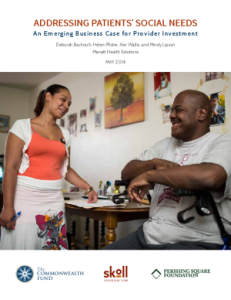 While the U.S. spends more per person on health care than any other country in the world, we get a very low return on that investment. Other countries whose health citizens enjoy significantly better health outcomes spend less on health “care” (beds, technology, doctors’ salaries) and more per capita on social services and supports.
While the U.S. spends more per person on health care than any other country in the world, we get a very low return on that investment. Other countries whose health citizens enjoy significantly better health outcomes spend less on health “care” (beds, technology, doctors’ salaries) and more per capita on social services and supports.
There’s growing evidence that social factors impact health, and a business case to be made for spending more on social. The evidence and argument for providers spending more on social needs is explained in the research paper, Addressing Patients’ Social Needs: An Emerging Business Case for Provider Investment, from The Commonwealth Fund, Skoll Foundation, and Pershing Square Foundation.
Social factors include income, education, access to good food and safe housing, and employment — together which influence 40% of health outcomes. THINK: asthma, diabetes, and heart disease. THINK: emergency room over-use, late-stage cancer diagnoses, and foot amputations due to ill-managed diabetes.
Examples of social needs and tactics to address their health impacts include:
- Housing, assessing and mitigating home safety, pest extermination, appliance repair (say a patient needs to refrigerate a medicine and lacks a working fridge), utility shut-offs
- Food, connecting people to food supports like SNAP, food banks, Meals on Wheels, and prescriptions for healthy foods
- Public benefits, such as reversing Medicaid wrongful denials, counseling and “on-ramps” to public benefits
- Employment, offering workshops to help develop skills, referrals to Job Banks, apprenticeships, community college links.
The report details several programs that have incorporate social dimensions and have yielded hard-dollar savings, indirect economic benefits and positive health outcomes for people including the Adirondack Medical Home Demonstration, Camden Coalition of Healthcare Providers, Community Asthma Initiative in Boston, Frequent Users of Health Services Initiative in California, Geriatric Resources for Assessment and Care of Elders (GRACE), Health Leads, the Medical-Legal Partnership, and the Seattle-King County Healthy Homes Project.
Health Populi’s Hot Points: As the U.S. is moving to pay for health care in terms of value, away from volume, social factors become part of the hard-dollar equation. This report notes that two-thirds of health providers have signed value-based contracts with private payers, and that providers’ participating in shared financial risk contracts more than doubled between 2011 and 2013.
As this trend continues, the case for addressing social factors in health citizens’ lives will become increasingly clear and compelling.




 I am so grateful to Tom Lawry for asking me to pen the foreword for his book, Health Care Nation,
I am so grateful to Tom Lawry for asking me to pen the foreword for his book, Health Care Nation,  I love sharing perspectives on what's shaping the future of health care, and appreciate the opportunity to be collaborating once again with Duke Corporate Education and a global client on 6th May. We'll be addressing some key pillars to consider in scenario planning such as growing consumerism in health care, technology (from AI to telehealth), climate change, and trust -- the key enabler for health engagement or dis-engagement and mis-information. I'm grateful to be affiliated with the corporate education provider
I love sharing perspectives on what's shaping the future of health care, and appreciate the opportunity to be collaborating once again with Duke Corporate Education and a global client on 6th May. We'll be addressing some key pillars to consider in scenario planning such as growing consumerism in health care, technology (from AI to telehealth), climate change, and trust -- the key enabler for health engagement or dis-engagement and mis-information. I'm grateful to be affiliated with the corporate education provider  Thank you FeedSpot for
Thank you FeedSpot for